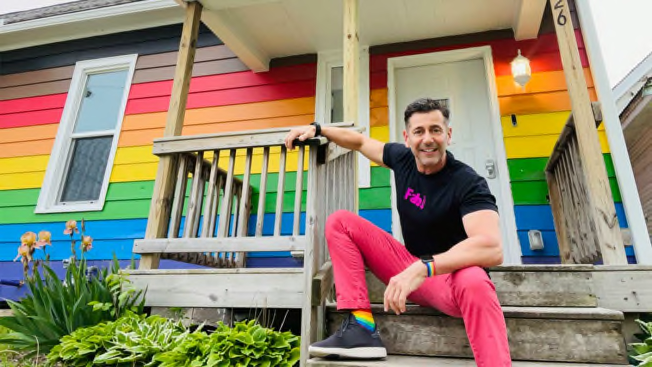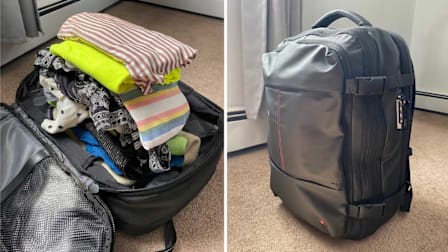Vacation Rental Options for LGBTQ+ Travelers
Tips from industry experts on how to avoid discrimination on Airbnb, FlipKey, Vrbo, and other similar sites

Vacation rental websites such as Airbnb now offer more rooms for rent than the world’s top five hotel chains combined. But unlike hotels, some of these platforms encourage patrons to provide personal information in advance. Hosts can scrutinize a potential guest’s profile and picture before opening their homes to them—homes, that, in some cases, are occupied by hosts and guests at the same time.
For members of the LGBTQ+ community, this has presented challenges.

Photo: Robert Geller Photo: Robert Geller
There are more hosting platforms to choose from, too. “We each have our own coming out experience, and unfortunately, you get to live that at a new job, with new friends, and in travel,” says Robert Geller, a former Airbnb Superhost—a designation awarded to well-reviewed, experienced hosts. He went on to create FabStayz, an online platform that caters to LGBTQ+ hosts and travelers, after an awkward coming-out experience with a stranger in the kitchen of his Tampa, Fla., townhouse. Geller says he hopes to take some guesswork out of the peer-to-peer stay rental experience.
FabStayz-approved hosts need to have at least five months of experience and excellent reviews on another major hosting platform, and they need to agree to abide by the community guidelines. They also have to complete the FabStayz University Curriculum of Inclusive Hospitality, an online training series designed to help hosts better meet the needs of LGBTQ+ travelers. “We put a lot of barriers to keep haters outside,” Geller says.
Pro-LGBTQ+ Policy vs. Practice
Almost every online travel platform has an anti-discrimination policy. Airbnb has been recognized as one of the best places to work for LGBTQ equality based in part on its nondiscrimination policies and equitable benefits structure.
But the chasm between internal company policies and an individual host’s bigotry can be massive. There have been widely reported instances of discrimination from hosts based on sexual orientation and race. In one 2015 case in Galveston, Texas, a self-professed “straight-friendly” host kicked out a same-sex couple after discovering the booking guest’s significant other was another man.
After this and similar incidents, an Airbnb spokesperson says the company instituted a “Community Commitment” policy in November 2016. The policy asks hosts to agree to treat everyone in the Airbnb community with respect, regardless of their race, religion, national origin, ethnicity, disability, sex, gender identity, sexual orientation, or age.
Andora Kat Williams, a Black lesbian expat author currently living in Tblisi, Georgia, behind the Queer-affirming travel vlog Wandering Soup, knows a thing or two about prejudice and bias. But that’s not what she’s experienced on Airbnb.
For example, in Singapore, where same-sex relationships are not legally recognized, and Malaysia, where there are no legal protections for LGBTQ+ individuals, Kat’s strategy was to be transparent when traveling with a partner. “When I go to reserve, I say, this is who I am,” says Mississippi-born Kat. “I’ve never had anyone turn me down.”
Transparency may be the best policy for Kat on her world travels, but anonymity is the antidote to discrimination at FlipKey, a vacation rental company owned by TripAdvisor. In addition to terms of use prohibiting discrimination by hosts, profiles are largely anonymized.
Like FlipKey, listings on Vrbo, another vacation rental platform, feature a “book now” button that minimizes contact between potential renters and property owners. The Expedia Group, Vrbo’s parent company, has a full-time Trust and Safety team monitoring content across their brands for discriminatory content, an Expedia Group spokesperson told us. Anyone found violating the company’s zero-tolerance policy regarding discrimination, harassment, or violence is removed from the Vrbo platform, the spokesperson said.
Expedia Group, Vrbo and Orbitz’s parent company, has a history of advocating for LGBTQ+ inclusion and equality in travel as well. Orbitz’s “Travel As You Are” campaign, along with a microsite devoted to LGBTQ+ travel, features trip planning guides, directories of LGBTQ+-owned businesses, and a first-person account of a nonbinary individual’s reflection on traveling while trans.
Orbitz’s website also has a gay-friendly hotels filter that users can use to find hotel rooms and rental properties that will “go to exquisite lengths to create a safe, nurturing place to rest your head,” the company says. Guests may be more welcomed, but their options may become more limited.
How to Flag Anti-LGBTQ+ Bias
So what happens when the rubber meets the road trip and your vacation rental is less than community standard-compliant? Three of the largest sharing economy travel platforms told us what you can do.
Airbnb
Airbnb’s website has a page where guests can report discrimination. The company says each report initiates an investigation from which “corrective action” will be taken, “and if someone has violated our nondiscrimination policy, they may face warnings, suspension, or account removal.”
Vrbo
“If guests or hosts encounter harassment, discrimination, or see offensive content, they should call our Vrbo customer support line at 877-202-4291 to report the incident,” says an Expedia Group spokesperson. “If we receive a report from governments, the media, or customers about someone with the intention to violate this policy, we will remove them from our platform.”
FlipKey
The help center at FlipKey provides guests a couple ways to reach the company in the event of discrimination, including email and a 24-hour helpline. FlipKey says it aims to respond to emails within 24 hours, and if your issue is urgent, you should call the company at 844-558-6015.
How to Identify Pro-LGBTQ+ Hosts and Hotels
“Safety looks different for everybody,” says Geller of FabStayz. He explains that allies can make LGBTQ+ travelers feel welcome from the beginning by using their preferred pronouns in listings. When hosts identify themselves with their pronouns for gender identity, such as they/them, he/him, and she/her, Geller says it creates an atmosphere of understanding. “It’s a big signal with so little effort,” says Geller, who also suggests inserting a slide of a rainbow flag or an “All Welcome Here” sign into pictures of a host’s property.
“When you’re dealing with an individual who owns a home vs. a brand of hotel, you need to ask questions,” says Tanzella at the International LGBTQ+ Travel Association. He recommends having those sometimes difficult conversations as early in the booking process as possible.
Kat’s tip for success in what could be an uncomfortable situation is a mix of oversharing and good old-fashioned research. Kat believes in guests disclosing as much about themselves and their trip as they can. “A lot of people say, ‘Don’t do that,’” Kat says. “I think if you do that you may be rejected, but at least your feelings won’t get hurt on-site.”
The couple also suggests that consumers use every online resource available before booking a short-term stay, including Google Maps to check out the property and surrounding neighborhood, searching for any news about LGBTQ+ discrimination issues in the immediate area, and joining LGBTQ+ Facebook groups to get perspective from locals.




